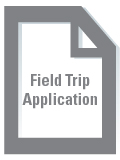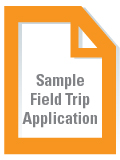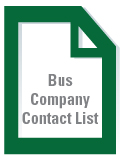Field Trips

Last Updated: 10/31/25
Our next application deadline is Friday, January 9, 2026 by 5pm
Current maximum grant funding request is $4,844.86
Please direct your questions to Tyler Van Fleet, East of Hudson Forestry Program Coordinator, at education@nycwatershed.org.
Discover Your Watershed!
Walk along the top of a dam for views of blue reservoirs. Hike through forests on trails and roads engineered to reduce water pollution. Meet the farmers who produce your food while also protecting the source of your drinking water. Catch glimpses of white-tailed deer, red squirrels, and eagles roaming the New York City Watershed’s wild areas.
engineered to reduce water pollution. Meet the farmers who produce your food while also protecting the source of your drinking water. Catch glimpses of white-tailed deer, red squirrels, and eagles roaming the New York City Watershed’s wild areas.
The most powerful way to learn about NYC’s remarkable water supply system is to experience it first-hand. WAC supports groups that want to understand how forests and people work together to provide NYC with some of the best drinking water on the planet. So, go on, discover your watershed forest-filtered water supple by applying for a Watershed Forestry Field Trip Grant today! View the Field Trip flier.
Program Overview
- This competitive grant program awards funds to help pay for watershed forestry-related trips to the NYC Watershed.
- Any organization, community group, or 4-12thgrade classroom in municipalities wholly or partially within the East and West of Hudson Watersheds or the 5 boroughs of NYC may apply. If you’re not sure if you are eligible, please email education@nycwatershed.org.
- All trips include a visit to a NYC-DEP drinking water reservoir.
- There are 2 rounds of funding each year with applications due in early January & August and partial funding is often awarded primarily for transportation costs.
- Grantees receive half of the grant award up front and the second half as reimbursement after the tour.
How to Apply
- Download and review the Sample Application below to understand what a strong application should include.
- Visit our Teacher Resources webpage, especially the Watershed Forestry Essentials and Watershed Forestry Activity Kit, for background information and teaching resources about the 3 main program themes:
Theme 1: Watershed form and function (e.g. what is a watershed, what defines a watershed and how does it function, why do watersheds need protection, etc.)
Theme 2: Watershed trees and forests (e.g. what are forest ecosystems, how do trees & forests filter and protect water quality [in upstate drinking water watersheds and in downstate suburban/urban environments], what other benefits do trees & forests provide, etc.)
Theme 3: The New York City water supply system (e.g. what are the different parts of the system, the history of its construction, how can we conserve water and help care for our drinking water watersheds, etc.) - Download the Field Trip Application below and complete it electronically (hand-written applications will not be considered). Use the Field Trip Guides and Bus Company Contact List below to help with your planning and budgeting.
- Complete the Administrative Support Form on the last page of the application. You may also download the Administrative Support Form separately below.
4 FIELD TRIP OPTIONS
IMPORTANT: For each Option below, click the FIELD TRIP GUIDE PDF link for detailed information about bus and programming costs,
course options, and sample itineraries.
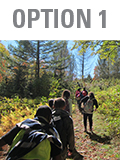 ENVIRONMENTAL CENTER & RESERVOIR TOUR
ENVIRONMENTAL CENTER & RESERVOIR TOUR
Explore the NYC watershed at 1 of 5 Environmental Centers. Select programming from among the centers’ watershed forestry-themed courses listed below. At Clearpool and Frost Valley, you may choose to explore a Model Forests, which is a living classroom that demonstrates sustainable forestry practices for water quality protection. All trips include a guided visit to either the Cross River Dam and Reservoir (East of Hudson trips) or the Neversink Reservoir (West of Hudson trips). Teatown Lake Reservation hosts day trips only. All other centers host day and overnight trips.
EAST OF HUDSON
Green Chimneys Clearpool Campus website
GREEN CHIMNEYS FIELD TRIP GUIDE (PDF)
Taconic Outdoor Education Center website
TOEC FIELD TRIP GUIDE (PDF)
Teatown Lake Reservation website
TEATOWN FIELD TRIP GUIDE (PDF)
Fresh Air Fund’s Sharpe Reservation website
SHARPE RESERVATION FIELD TRIP GUIDE (PDF)
WEST OF HUDSON
Frost Valley YMCA & Model Forest website
FROST VALLEY FIELD TRIP GUIDE (PDF)
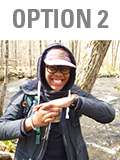 TROUT IN THE CLASSROOM TROUT RELEASE & RESERVOIR TRIP
TROUT IN THE CLASSROOM TROUT RELEASE & RESERVOIR TRIP
Trout in the Classroom (TIC) participants travel to Ward Pound Ridge Reservation in Westchester County in April or May to release their trout into the Cross River, which flows directly into the Cross River Reservoir that supplies drinking water to NYC. TIC and WAC educators lead customized watershed, forestry, and water quality activities that investigate the connection between healthy forests, trout habitat and clean drinking water. All trips include a guided visit to the nearby Cross River Dam and Reservoir. Maximum number of participants, including adults, is 112, or the capacity of 2 coach buses.
Trout in the Classroom website
TIC FIELD TRIP GUIDE (PDF)
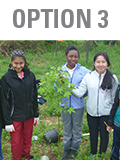 TREES FOR TRIBS TREE PLANTING & RESERVOIR TRIP
TREES FOR TRIBS TREE PLANTING & RESERVOIR TRIP
Be an active steward of your watershed and help improve water quality by planting trees along tributaries (streams) that flow into NYC drinking water reservoirs! Trees for Tribs tree planting trips take place in late April or early May at sites across the Croton Watershed in Westchester and Putnam Counties. In addition to planting trees, WAC educators lead customized watershed, forestry, and water quality activities. All trips include a guided visit to the nearby Cross River Dam and Reservoir or New Croton Dam and Reservoir. Student groups must be 6th grade or higher. Maximum number of participants, including adults, is 56, or the capacity of 1 coach bus.
Trees for Tribs website
TREES FOR TRIBS FIELD TRIP GUIDE (PDF)
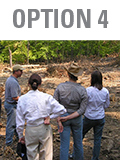 ADULT PROFESSIONAL DEVELOPMENT TRIP
ADULT PROFESSIONAL DEVELOPMENT TRIP
Witness the source of your drinking water and explore how well-managed forests protect water quality and support local economies in the NYC watershed. All trips include a guided visit to a NYC-DEP drinking water reservoir. We strongly recommend visiting one of WAC’s four Model Forests, which are living classrooms that demonstrate sustainable forestry practices for water quality protection. Other environmental or cultural sites may be included depending on group interests. Visit the Catskills Watershed Corporation’s Field Trip Ideas webpage for a list of great possible destinations throughout the watershed regions.

